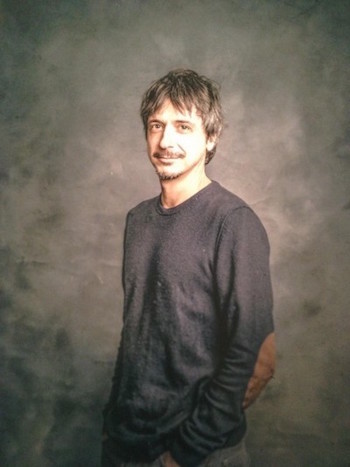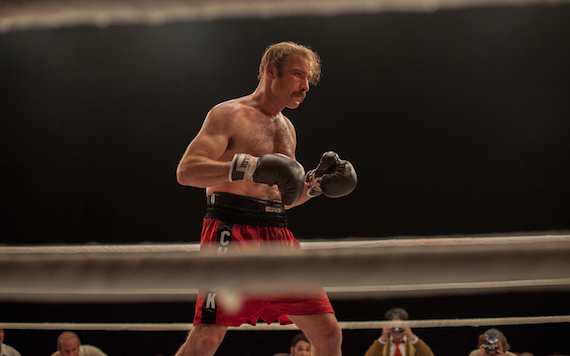It is seldom that you meet someone you can honestly, and with a straight face call kind in the cinema business. It's even more rare to find a person like that who has made a movie you love. And the odds become infinitely more minute that the film you love which this kind filmmaker has made is about a boxer, someone paid to punch people around. Have I tickled your imagination yet?
Earlier this year I watched Philippe Falardeau's The Bleeder in Venice. The film stars Liev Schreiber which immediately put it on my radar, along with Naomi Watts playing fabulously against type, and is directed by the Oscar-nominated Falardeau, who previously helmed such favorites as Monsieur Lazhar and The Good Lie. There is a feel to Falardeau's filmmaking, a mystical je ne sais quoi that draws the audience in, and yet never shouts for attention. The filmmaker seems content to simply take us along for a ride that he knows will change our lives by revolutionizing our outlook on life. The Bleeder is no different.
First of all, the story itself reworks the myth of a classic, Rocky, by showing us the real man who inspired the series of movies we've all watched and loved. The film takes the audience on a journey inside the real-life story of New Jersey boxer Chuck Wepner -- the man famous for having been defeated by Mohammad Ali in the fifteenth round of the "Give the White Guy a Break" fight in March of 1975. But then, once the flashing lights and loud boxing bells stop flashing and sounding, Wepner is left to deal with fame. That fame, that has come out of losing to a legend. The results are perfectly cinematic.
The Bleeder is at this year's Dubai International Film Festival as a Gala Screening and I wanted to share a few highlights of my talk with Falardeau, who continues to inspire me with his effortless kindness and thought-provoking film.
The Bleeder is such a different film from any of your previous ones, can you talk about what made you choose the project?
Philippe Falardeau: If I'm lucky I'll get to do twelve films, fifteen in my life and I came to movie making by a series of accidents. So I want to explore completely different things. When you set out to do a movie you have to immerse yourself into the new surroundings. That's one of the qualities of this job, that you can go into a new world you know nothing about, explore it and try to learn about it. So I met some boxers, did some research on boxing but boxing is like five minutes in the movie. It's not just about that. There was an identity thing I loved about the character, that he was struggling with a mirage image of himself, created in Hollywood. Now this is closer to me, a character with identity problems and identity has been part of all my films.
Do you identify with Chuck in the film?
 Falardeau: I don't know how I would react if were to become, all of a sudden an actor on the world stage as important as fighting with Mohammad Ali, and getting instant recognition not because he won, but because he lost. How many times do you become a hero even if you lost? And he becomes a folk hero and he's confronted with a very powerful image of himself created by a machine called Hollywood. I don't know many people who could go through that and stay the same person. We are regular people, we don't have star status but we can certainly relate to wanting to be loved. Not only by people who surround us but getting a pat on the back by a stranger. As a filmmakers in Montreal I get recognized sometimes and people come up to me on the streets and will say "we love you, we love what you do." No, you don't love me, you like my films but thank you. I don't say that of course but you get this instant love and what do you do with that?
Falardeau: I don't know how I would react if were to become, all of a sudden an actor on the world stage as important as fighting with Mohammad Ali, and getting instant recognition not because he won, but because he lost. How many times do you become a hero even if you lost? And he becomes a folk hero and he's confronted with a very powerful image of himself created by a machine called Hollywood. I don't know many people who could go through that and stay the same person. We are regular people, we don't have star status but we can certainly relate to wanting to be loved. Not only by people who surround us but getting a pat on the back by a stranger. As a filmmakers in Montreal I get recognized sometimes and people come up to me on the streets and will say "we love you, we love what you do." No, you don't love me, you like my films but thank you. I don't say that of course but you get this instant love and what do you do with that?
I was at the party for the film [in Venice] and there you get introduced to all these people who are not good for you but they are very interesting. I'll leave it to your imagination and all kinds of stuff lying around and because I did a film, then you have access to all of this and to all kinds of temptation.
They will come to you and use these words, these superlatives and there is no room after that. "You are a genius!" OK. What else is there after that, after genius, there is nothing. And if that's the first thing they say to you, you hit a wall. Then you listen and nod and smile but once in a while you get someone who comes to you and says something about the film you haven't thought of. And oh, that becomes interesting and that becomes a real conversation.
Who came up with the idea of Liev taking real hits in the film?
Falardeau: It was not the insurance! I remember watching a boxing match at Liev's house in Santa Monica, and I turned to him and told him -- "I'm not an expert about boxing but most of the times in boxing movies I don't believe the hits". And he said, "me too," because they're not real hits. And it started from there. So we devised something that he could take real hits. But what Pooch Hall [who plays Ali in the film] did, he put his hands in the main part of the gloves, but didn't put his fingers through to the tips. So there are no fingers -- don't know if you've ever touched a boxing glove -- but it's kind of hard. I tried, I said I need to see what this feels like, took one half hit, Liev took hundreds and I don't know how he did it. His face was really swollen after two days.
What do you look for in cinema, when you watch a film?
Falardeau: If I watch a film and completely forget how it's shot and don't analyze it, the director has completely succeeded in making me a movie goer. But it's tough not to watch a film and analyze it. Sometimes you say, it's a great story, great actors, interesting photography, why am I not involved in this film. It's like a cake, the ingredients are there but the cake doesn't rise. Why? I don't have that answer and am still looking for that answer, as an audience and as a filmmaker. But I think I'm looking for something singular to a filmmaker. I want to see a film that couldn't be done by anyone else. I don't mean that particular script, any script could be done ten different ways. What I want to see is someone looking at life with a particularl point of view. I don't want to see craftsmanship and I don't want to see excellence, and I don't want to see someone trying to impress me. I want to see a singular point of view on life.
Has making The Bleeder changed your mind about the film Rocky?
Falardeau: No, I still think Rocky is a good film, because he looses at the end. It approaches this relationship and I like that the relationship is very sweet and very "pudique" -- how do you say it, modest, very simple, very sober. If I remember correctly, the boxing sequences actually look fake today, boxers do not fight like that at all. But that's irrelevant because this is probably the biggest boxing movie along with Scorsese's Raging Bull so you fight not against real life boxing but the mythology of boxing in a movie. When you bring up boxing moments in a film.
And finally, what is your own experience with the sport?
Falardeau: My agent bought me boxing gloves at the beginning of shooting and I haven't gotten anywhere with those. I'm not a violent person. I cannot afford to be.
All images courtesy of DIFF, used with permission.

